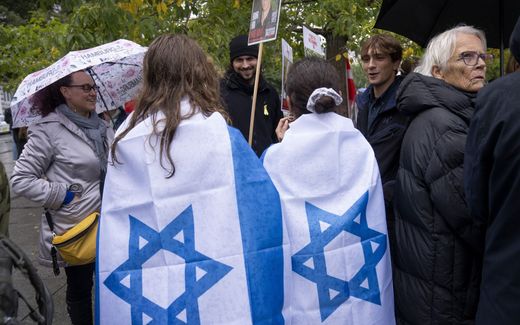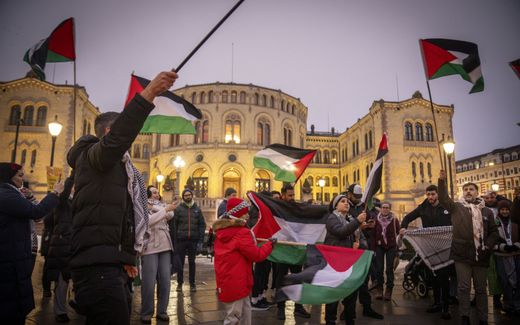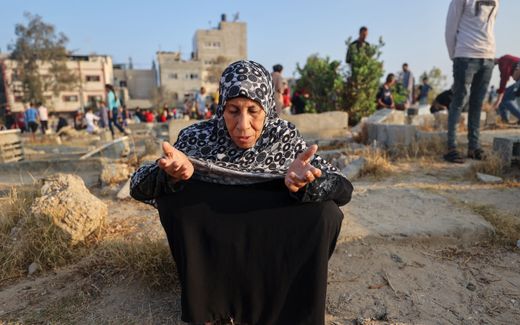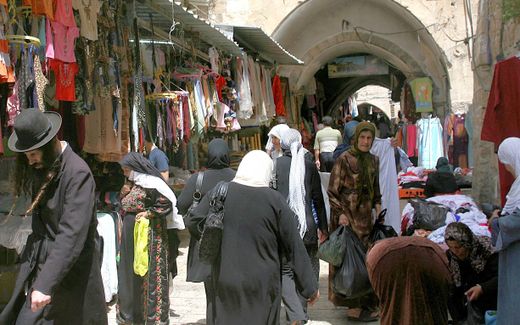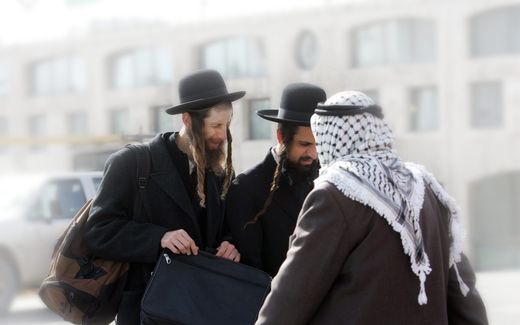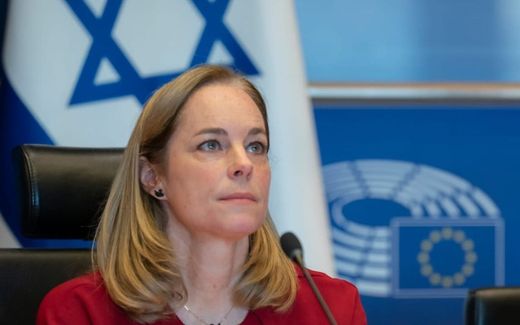Palestinian Christians would value theology that creates hope
07-10-2025
Opinion
Jack Nassar
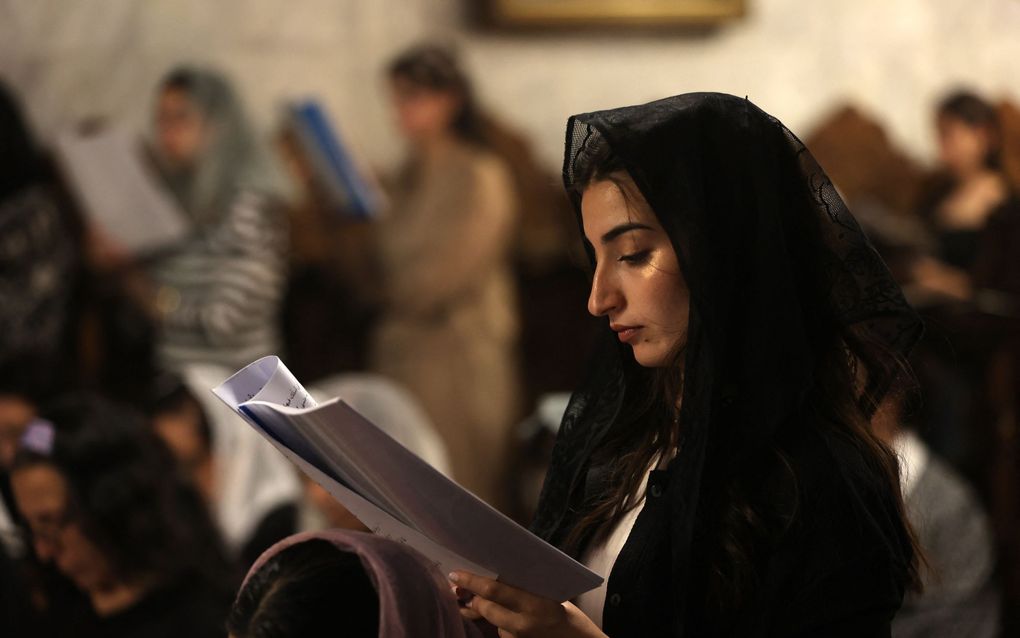
Palestinian Christians attend a mass at the Greek Orthodox church of Saint Porphyrius in Gaza City. Photo AFP, Omar Al-Qattaa
Opinion
Jack’s mother always sets an extra plate on the table in case the emigrated neighbours return. But they never come back. And Jack’s nephew asks why his friend emigrated. Very likely, because his parents felt hopeless. But what should theology bring for a nation: hope or hopelessness?
Stay up to date with Christian news in Europe? Sign up for CNE's newsletter.
Jacob Hoekman’s article “How Christians Can Still Love Israel” reached me here in Ramallah during the night at 1:30 a.m., and I haven’t been able to sleep since. I was watching an old Egyptian film with a friend. While Hoekman crafts careful theological distinctions about replacement theology and Israel, we stay up late helping neighbours survive in a reality you seem unable to see.
Every design my friend Suha creates carries hope. His embroidery shop sends traditional Palestinian patterns to customers in Europe and the Gulf. These small acts of economic resistance are prayers for survival.
But he also creates memorials. Tributes for businesses that close when families emigrate. Church newsletters announcing mergers because congregations are shrinking. Farewell posts for community centres emptied by young people leaving for Europe or America. His files become a quiet graveyard of Palestinian Christian presence. Each “404 Page Not Found”, a disappeared website, feels like a personal loss.
Framework
Jacob Hoekman warns against easy theological one-liners, yet I wonder if this one is still hidden in his writing: that Palestinian Christians are less central to God’s story, that our disappearance is an acceptable cost of His framework.
A few months ago, my friend prepared a church website for Easter. He counted forty-three faces in a sanctuary built for three hundred. Every empty pew represents a family crushed under Israeli occupation while waiting for the peace that people like Hoekman theologise about from comfort.
Hoekman quotes Kendall Soulen supporting Israel for secular reasons. But believe me: there are no purely secular actions here. Every political or theological stance touches real families who lie awake worrying whether their children will inherit anything but sorrow. Half of my friend’s clients now ask him to design stores they can manage from Canada, the USA or Chile. His work enables the very diaspora that breaks our hearts.
Hoekman cites Mark Kinzer on God’s covenant with Israel and warns against replacement theology. But what about God’s covenant with Palestinian Christians? In his writing, we appear only as “the people of Gaza,” without names, faces, dreams, or faith. This is not a small oversight. It is a wound. We disappear entirely from the theology Hoekman promotes.
Permits
From Europe, it might seem possible to maintain careful distinctions: support Israel theologically while worrying about Palestinians morally, send money to support Israeli settlements while praying for peace. But seen from Ramallah, this so-called balance is a fairytale. It looks like the privilege of those who will never stand in line for permits to visit their churches, whose children may never see the homes of their ancestors, whose theology will never face checkpoints, road closures, and the slow strangulation of hope under Israeli occupation.
Palestinian Christian parents face questions that Hoekman’s theology never touches: should we raise our children to stay, or prepare them to leave? Should we teach Arabic and Palestinian history or focus on English and digital skills for emigration?
My fourteen-year-old nephew asked why so many classmates had disappeared. “Uncle, why did Fadi move to Germany? Why did Salwa go to Spain? Are we going somewhere too?” Their friends were not chasing adventure. They were fleeing hopelessness that polite Western theology often helps sustain.
Suffering
Hoekman’s article ends by claiming it is possible to love Israel without losing empathy for the suffering of the Gazans. We are not only Gazans. We are people of Ramallah, Bethlehem, Jericho, Hebron, Jerusalem, Galilee, and Nazareth. We carry names, dreams, history, churches, and faith traditions. The love Hoekman describes is too small. It cannot hold the full complexity of God’s work in this land.
I invite Hoekman to leave his comfortable theology. Come to Ramallah. Sit with families as they decide whether to stay or go. Stand in half-empty churches. Listen to young people explain why they are learning German, French, Spanish, or English instead of investing in futures here.
This October marks the second anniversary of the ongoing war in Gaza. It is a time when the world is slowly rising to recognise Palestine, especially Western countries. Germany and the Netherlands have the opportunity to follow and lead if they genuinely believe in a two-state solution where Palestinians and Israelis live together and side by side. No one should have to suffer for the sake of theological convenience.
Their faith feels heavier than my doubt. Their hope outlasts despair.
The Gospel was born among Palestinian Jews, Samaritans, pagans, Romans, Greeks, Arabs, and Canaanites, the ancestors of today’s Palestinian Christians. However, when the love for modern Israel requires our eradication, when theology helps create conditions that drive us out, it severs the roots of our faith.
I still carry stories. My grandmother stayed through the 1948 Nakba because she believed God wanted Christians to remain in His land. My great-grandfather built our church with his own hands. My mother still sets an extra plate in case neighbours who moved to Australia a few years ago return unexpectedly. Their faith feels heavier than my doubt. Their hope outlasts despair.
Distance
The Christ we worship calls for love that refuses erasure. Any love that requires Palestinian Christians to vanish is not Christian love. The question is not whether you can still love Israel. The question is whether you can love as Christ loves: without conditions, without erasures, and without demanding anyone disappear to make theology work.
It has been two years since the ongoing war and decades under occupation. As Christians, what should we do? Should we keep watching from a distance, praying quietly, taking sides from afar? Or shall we work together to end all violence and hatred, starting here in the Holy Land, a land that has too often become a land of blood and fear, rather than the holy one it was meant to be? The choice is ours.
Related Articles

